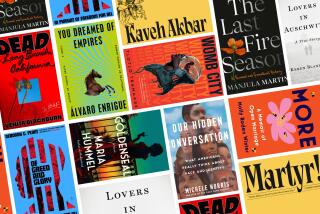Finding Time to Count Our Blessings
- Share via
The Lord sent such seasonable showers ... as through his blessing caused a fruitful and liberal harvest ... For which mercie, they sent aside a day of Thanksgiving.
So wrote William Bradford, one of the founders of Plimoth Plantation, about 1620. He put his flat-brimmed hat on a three-legged stool beside his writing table and took quill in hand. I do hope he had a lovely day and that he poured a noggin of applejack for the Indians the colony invited to the plantation.
As 1988 winds down like a music box, it is time to list the things for which we are grateful and for which old William set aside a day of thanks and gratitude.
I am thankful for rain falling in the night, for a fire crackling in the fireplace, for popcorn and really good penuche.
Animals, of course, the collie at your house and the Lhasa Apso at your neighbors’. For chrysanthemum-faced Peaches and for Mrs. Goldfarb, the cat of the indestructible liver and the clean teeth.
For shells with pink ruffled edges and for pounding winter surf thundering on the sand.
For fluffy ruffle ferns and paper-white narcissus. For snowdrops pushing through the snow at Christmastime in Aspen.
For people who smile at each other in elevators instead of gazing in mystical awe at the lighted numbers above the door.
For old friends and for new ones, especially one named Robert Fulghum. I found him last year and met him this year. He has written a book called “All I Really Need to Know I Learned in Kindergarten.” That’s the lead piece in a treasure box of short scraps of philosophy, love, weather, hot-air balloons, Indians, truck drivers.
I first heard the title piece read from the pulpit of a church on the side of a mountain in Colorado. I went back after the service and asked the young clergyman if he had a copy of it. He did and I asked him where he had discovered it. He said someone had sent it to him from the Kansas City Times.
I called that newspaper and they said they knew nothing about the writer but his name and maybe he lived in Seattle. Thinking I was embarking on a journey into a void, I called Seattle information and in two minutes was talking to Mr. Fulghum.
He told me that Dan Evans, a U.S. senator from Washington whom I had met when he was governor, had read the enchanting essay into the Congressional Record. From there it wafted clear across the United States like a dandelion puff and everyone who read it or heard it thought, “Oh, that’s the way it is. I always meant to say that.”
It’s as universal as fresh air and invigorating as the fragrance of a Douglas fir. This man lives on a houseboat with his beloved wife, Lynn. Of course he lives on a houseboat. Where else could he live unless it were in a tree house or a castle made of clouds?
He met Lynn, who is of Japanese ancestry, in Japan where he had gone to study to be a Zen priest. They met again the following year in London and, mutually enchanted, married and went to Seattle.
The book was begun when a kindergarten teacher in Southport, Conn., sent a copy of “All I Really Need to Know,” home with each member of her class and one little girl gave it to her mother who is a literary agent. She called Robert in Seattle and asked if he had written anything else. He had, indeed. He was a Unitarian minister for 20 years and had files of stuff, thoughts, fragments, musical words, things he had shared with his congregation.
We met a few weeks ago. I wiggled out of cooking a pot roast for Robert, which I had enticed him with over the phone. It was during the great termite tenting and Mrs. Goldfarb’s liver scan and facing the stove was too much. So we went to dinner and had a lovely time. Since then, Robert Fulghum has been on a book tour all over the United States answering the same questions from book reviewers and talk-show hosts on radio and television and being interviewed by newspaper writers.
Last Saturday, he came to dinner and I did do the pot roast. Oh, all right, Patsy made the gravy because she makes the greatest gravy in the world. And Patty and Bill Windom were here, and they are the kind of people who can enter any situation and make it pure delight. They are inordinately bright and Bill has yet to find anything that doesn’t interest him, a pebble from a creek bed, a hawk’s feather, a line of poetry, a third-act curtain line.
It was a delicious evening, full of conversation that thrummed like plucked harp strings and had the campfire coziness of an harmonica at the same time.
That evening goes high on my list of things to be grateful for this Thanksgiving.
Robert’s Kindergarten book will be No. 3 on the New York Times best-seller list next week. His second book will be out next September and his publisher wants a third. So do I.
Now, as we sit down and say grace, be thankful for books, Robert Fulghum’s, old ones of my father’s bound in soft leather, paperbacks and never mind the peanut-brittle crumbs between the pages. It just means that someone totally enjoyed the book and that, thanks be to Gutenberg, is why we have so much to be grateful for.






